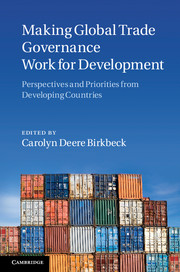 Making Global Trade Governance Work for Development
Making Global Trade Governance Work for Development from Part II - Roles and responsibilities in global trade governance: diversity in developing country priorities and strategies
Published online by Cambridge University Press: 07 September 2011
Least developed countries (LDCs) are faced with a suite of challenges to their effective participation in global trade governance. Global trade governance includes bilateral, regional and multilateral trade agreements, and intergovernmental institutions like the World Trade Organization (WTO) and United Nations Conference on Trade and Development (UNCTAD). This chapter focuses on the multilateral trading system and specifically the WTO. It explores the emerging role of LDCs in WTO decision-making processes for negotiating the rules of the multilateral trading system and makes concrete proposals for advancing their priorities.
After a brief background on LDCs in WTO decision-making processes, this chapter reviews the historical role of developing countries in decision-making related to the General Agreement on Tariffs and Trade (GATT), the emergence of developing country coalitions in multilateral trade negotiations and the development of the LDC coalition in the WTO. It then sets out LDC priorities for improved global trade governance, emphasizing the role of Special and Differential Treatment (SDT) and the need for LDCs to take greater ownership of efforts to integrate them into the trading system. It continues by making the case for the creation of an institution for LDC-specific needs in Geneva. The chapter concludes with a summary of recommendations.
To save this book to your Kindle, first ensure no-reply@cambridge.org is added to your Approved Personal Document E-mail List under your Personal Document Settings on the Manage Your Content and Devices page of your Amazon account. Then enter the ‘name’ part of your Kindle email address below. Find out more about saving to your Kindle.
Note you can select to save to either the @free.kindle.com or @kindle.com variations. ‘@free.kindle.com’ emails are free but can only be saved to your device when it is connected to wi-fi. ‘@kindle.com’ emails can be delivered even when you are not connected to wi-fi, but note that service fees apply.
Find out more about the Kindle Personal Document Service.
To save content items to your account, please confirm that you agree to abide by our usage policies. If this is the first time you use this feature, you will be asked to authorise Cambridge Core to connect with your account. Find out more about saving content to Dropbox.
To save content items to your account, please confirm that you agree to abide by our usage policies. If this is the first time you use this feature, you will be asked to authorise Cambridge Core to connect with your account. Find out more about saving content to Google Drive.